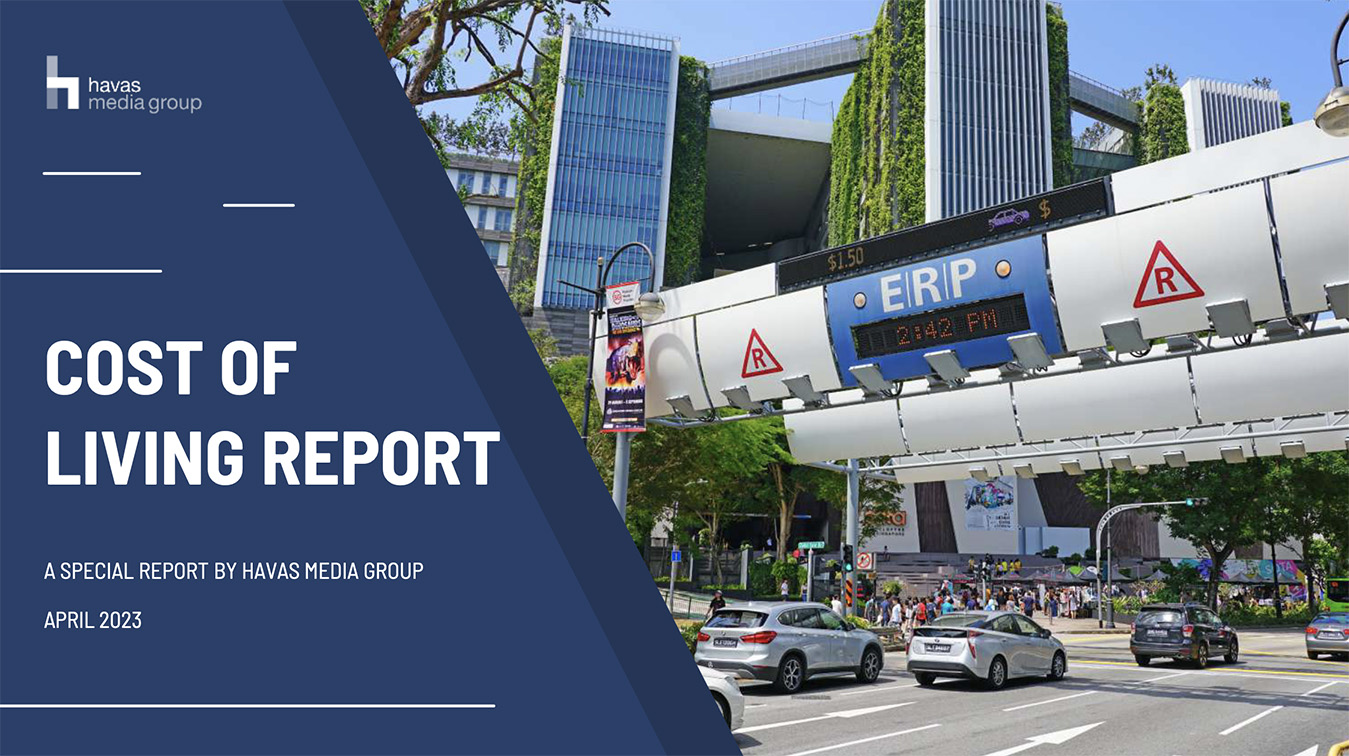Havas Media Group Singapore releases “Cost of Living” report offering insights into the impact of inflated costs on Singaporeans

Inflation, a tight labour market and supply chain disruptions have contributed to unprecedented increase in food and fuel prices unseen in the last decade. How has inflated cost of living changed the way Singaporeans go about their daily lives? Havas Media Group Singapore’s “Cost of Living” report sheds light on five key insights into the attitudes and behaviours of Singaporeans across four generations, and how brands can tap into these valuable perspectives to navigate through these challenging times.
Compiled based on responses shared by over 600 Singaporeans, the report reveals that the cost-of-living crisis is officially Singaporeans top-of-mind concern today. Across four generations (Baby Boomers, Gen X, Millennials, Gen Z) surveyed, a total of 23% ranked it as the biggest issue they face. A significant number (94%) of respondents feel the pinch, with older generations perceiving ‘larger increases in the cost of goods and services’ compared to the younger cohort.
Jacqui Lim, CEO, Havas Media Group Singapore, said: “Rising costs have impacted households and their purchasing decisions and it has become more important than ever for businesses to provide affordable solutions that meet the needs of customers. The findings in this report demonstrate the evolutions in consumer behaviours and expectations, the need for us to be more empathetic towards the feelings of consumers, as well as the opportunities for brands to engage in more meaningful and connected ways that will help them stay relevant.”
The five key insights uncovered are:
1. Inflation remains the primary concern for Singaporeans, though perceptions vary among generations.
23% of Singaporeans indicated that inflation and the rising cost-of-living is what weighs down on them the most. Interestingly, whilst many feel the pressure, the perceived increase in costs differs across generations – with Baby Boomers and Gen X feeling the pinch far more compared to Millennials and Gen Z. Brands can look at offering long term promotional deals to drive short term demand as well as help consumers in managing their finances.
2. A multitude of contributing factors dictate the crisis, with the government bearing the responsibility for providing aid.
The increased costs of living can be attributed to a variety of factors according to different age groups. Baby Boomers cite global socio-political factors, while Gen X blames inflation and Millennials point towards low wage growth. Gen Z identifies a mix of factors, including wage growth, unemployment, and financial conditions. Despite the differing reasons, 65% of respondents feel that it is the government’s responsibility to provide assistance during this period, while only 25% believe that brands should do more to help.
3. Price increases span multiple categories, influenced by differing generational priorities.
The top five areas where Singaporeans have noticed increased price perception include travel, groceries, petrol, dining out, and energy. To understand the value perceived by different generations, the study breaks down these categories for Baby Boomers, who are mostly concerned about basic necessities such as energy, groceries, and automotive fuel costs. Brands within these industries should focus on providing education and support to Baby Boomers, who may be more reluctant to seek assistance.
4. Inflation prompts spending behaviour adjustments, with some opting for moderation and others pursuing alternative strategies.
The survey reveals contrasting generational approaches to tackling inflation. Older generations, including Baby Boomers and Gen X, focus on cutting back expenses and saving harder. In contrast, younger generations like Millennials and Gen Z embrace hustling and take on additional jobs or opportunities. This shift is influenced by the resurgence of the FIRE movement, which encourages financial independence and early retirement, and the rise of hyphenated careers, where people pursue passions alongside primary professions for additional income and personal fulfilment.
5. Gen Z demonstrates strong optimism regarding the crisis’ duration, while simultaneously expressing scepticism.
Amid predictions of slow economic growth and high inflation in Singapore, most survey respondents expect a 1-2 year challenging period. However, Gen Z is more optimistic, with 23% believing the crisis will last 12-24 months. Their flexibility, readiness to switch jobs, and early-stage earning power contribute to their optimism. Yet, some Gen Z respondents also foresee a longer-lasting crisis of up to 5 years. High anxiety, stress, and struggling in the job market may prompt Gen Z’s pessimism, impacting not only everyday essentials but also major life decisions such as marriage, home-buying, and raising children.
What Can Brands Do?
While the inflationary pressures show no signs of abating, Havas Media Group Singapore’s latest report has identified a few unique opportunities that brands can leverage in order to eke an advantage during these uncertain times.
Tapping on their longstanding Meaningful Brands’ research, which examines the changes in consumers’ relationship with brands and their wider expectations from products and services, the report highlights the importance for brands to understand the varying expectation gaps across generations; why building a long-term brand vs. creating short-term demand is a more effective strategy, and why it is crucial to create real connections with audiences.
